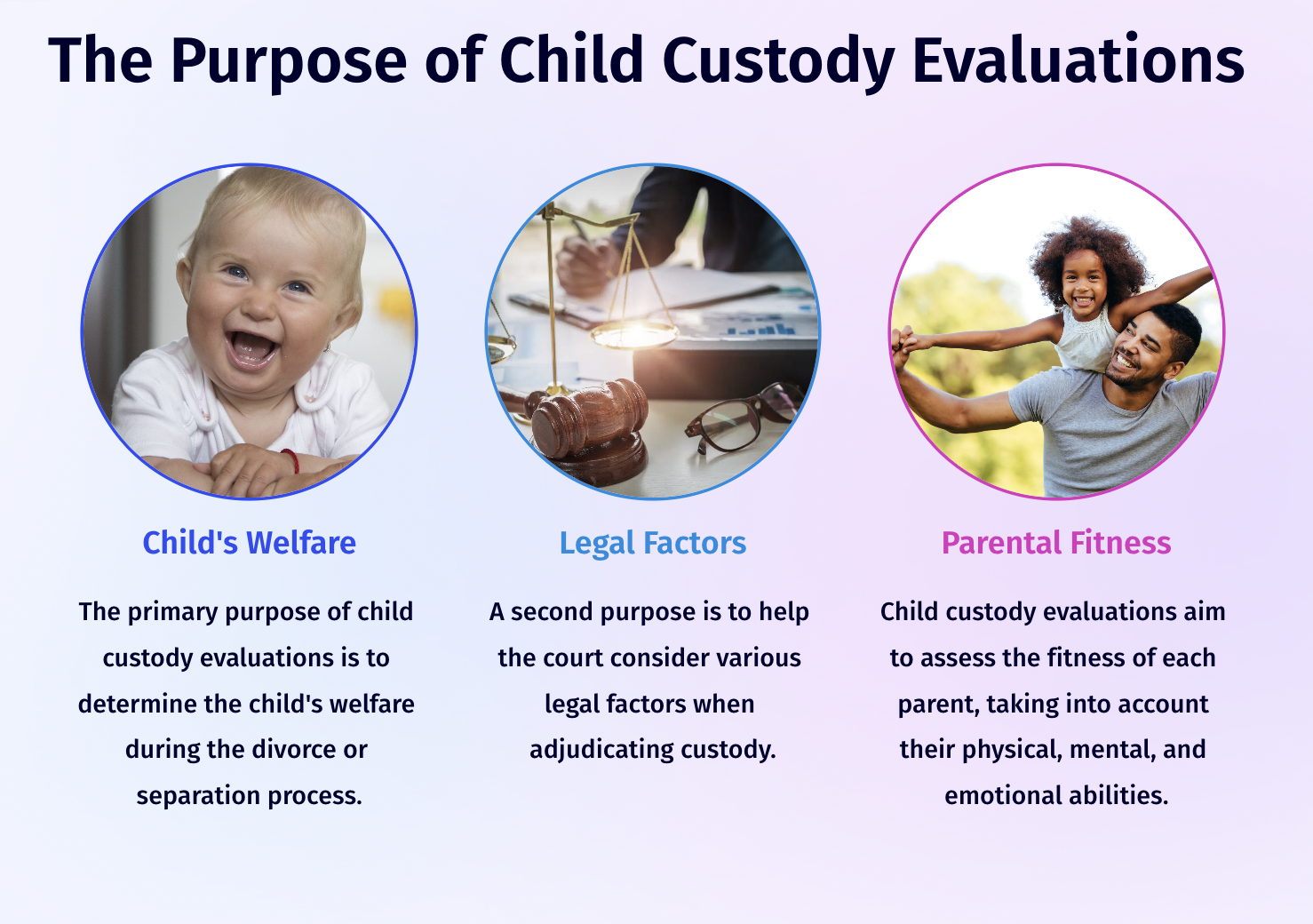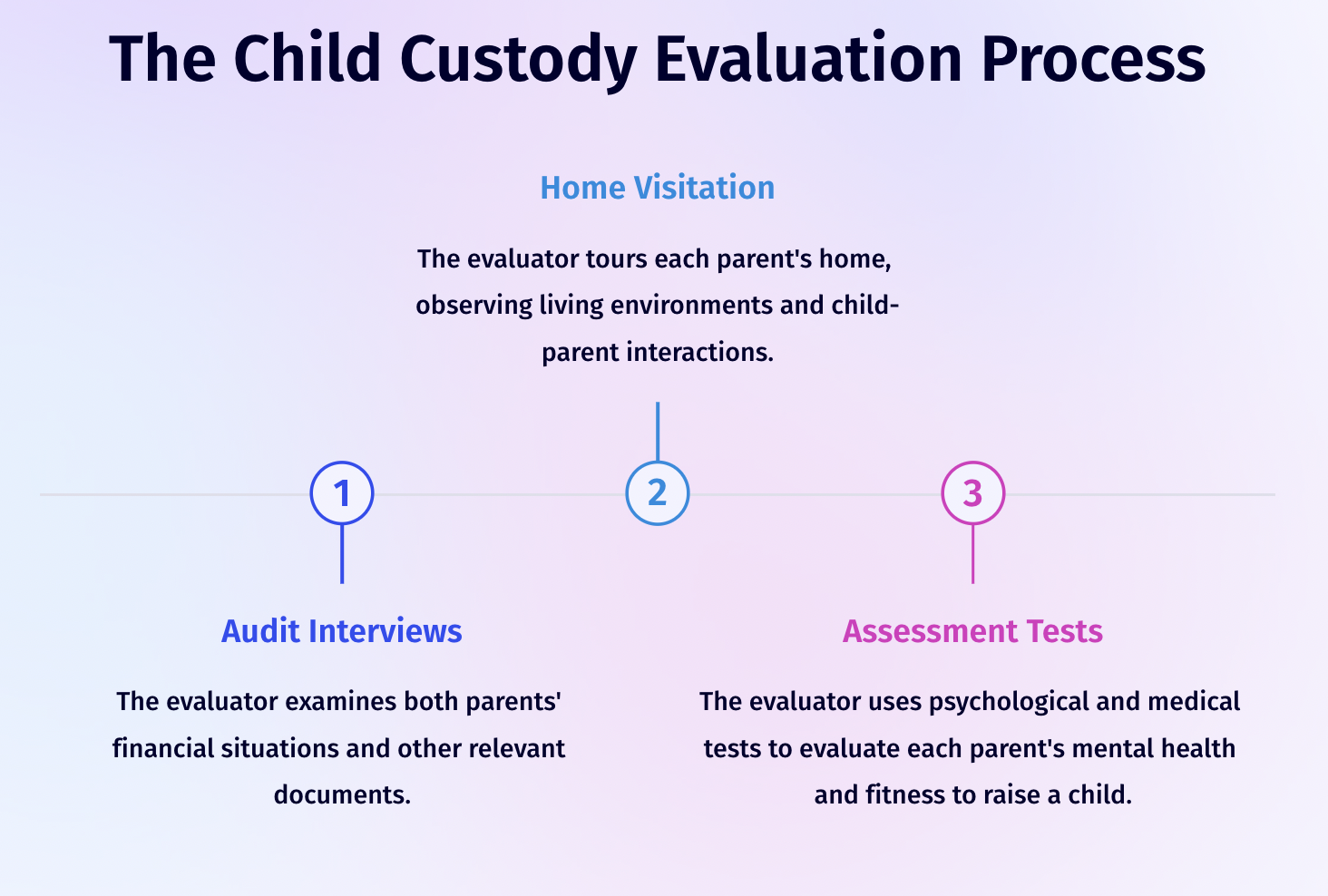CUSTODY EVALUATION ATTORNEYS IN CALIFORNIA
Child custody evaluations in California are often complex and emotionally charged legal proceedings. When parents cannot agree on custody arrangements, a family court judge may order a custody evaluation to determine the best interests of the child. In these cases, it is essential to have a skilled child custody evaluation lawyer who can help navigate the process and protect the interests of both the child and their client.
Whether you are considering a child custody evaluation or have already been ordered to participate in one, a skilled attorney can provide the advice and advocacy you need to protect your rights and achieve the best outcome for your family. Learn about the custody evaluations in California including:

At Modern Family Law, we recognize that every child custody case is unique, and there is no one-size-fits-all approach. Our team of experienced attorneys specializing in California custody evaluations is ready to listen to your story and offer tailored guidance that meets your specific needs. We strive to provide unwavering support to our clients and are committed to protecting their relationships with their children. Reach out to us today to speak with an attorney.
WHAT IS THE PURPOSE OF
CUSTODY EVALUATIONS?
Child custody battles can be emotionally charged and challenging for all parties involved, especially when children are caught in the middle. In California, family law courts often order child custody evaluations to assist judges in making informed decisions about child custody arrangements. A child custody evaluation is an assessment conducted by a court-appointed evaluator who provides a detailed report on the child's living situation and relationships with parents.
In California, courts order child custody evaluations to help judges determine what custody arrangement would be in the best interests of the child. The evaluator provides a detailed report to the court, which outlines the living situation and relationships with parents. The report may make recommendations for custody and visitation schedules, which the judge may consider in making a final custody decision. The evaluator may also identify any potential issues that may arise, such as substance abuse or mental health problems.

THE CALIFORNIA
CUSTODY EVALUATION PROCESS
The process of child custody evaluations in California typically involves several steps. First, the court will appoint an evaluator, who is typically a licensed mental health professional or an attorney. The evaluator will then conduct interviews with the parents, the child, and any other relevant parties, such as teachers, doctors, or therapists. The evaluator may also observe the parents and child together, review any relevant documents or records, and administer psychological tests or evaluations. Once the evaluation is complete, the evaluator will submit a report to the court.
There are three types of child custody evaluations in California: full, focused, and brief. A full evaluation involves a comprehensive assessment of the child's living situation, including interviews with parents and other relevant parties, psychological testing, and observation of parent-child interactions. A focused evaluation is more limited and focuses on specific issues, such as the child's preference for custody or the mental health of one of the parents. A brief evaluation is the most limited type of evaluation and may only involve a review of documents and a brief interview with the parents and child.

The cost of a child custody evaluation can vary widely and may depend on the type of evaluation, the complexity of the case, and the evaluator's fees. It is not uncommon for a child custody evaluation to cost several thousand dollars.
WHAT FACTORS ARE CONSIDERED IN
CALIFORNIA CUSTODY EVALUATIONS
California family courts consider a wide range of factors when making custody decisions. These factors include the best interests of the child, the mental and physical health of the parents and child, the parent-child relationship, the ability of each parent to provide for the child's needs, and the child's preferences (if age-appropriate). The evaluator will consider all of these factors when making recommendations for custody and visitation arrangements. The evaluator may also consider any additional issues that arise during the evaluation, such as domestic violence or substance abuse.
Child custody evaluations are an essential part of the custody determination process in California. They provide judges with critical information about the child's living situation and relationships with parents, helping them make informed custody decisions. Parents who are going through a custody evaluation should be honest and transparent with the evaluator, cooperate with the process, and focus on the best interests of the child. An experienced family law attorney can also provide guidance and support throughout the evaluation process.

WHAT OUR CLIENTS SAY ABOUT OUR
EXPERIENCED CUSTODY EVALUATION LAWYERS IN CALIFORNIA
I only ended up choosing another attorney to go with because of some very specific nuances of my case. However, before I went with that attorney, Grace was at the Top of my List! I highly recommend her and Modern Family Law Firm. They consulted the extreme vulnerability of my situation so delicately and with the utmost professionalism, and I thank them for their consideration and time 🙂
I only ended up choosing another attorney to go with because of some very specific nuances of my case. However, before I went with that attorney, Grace was at the Top of my List! I highly recommend her and Modern Family Law Firm. They consulted the extreme vulnerability of my situation so delicately and with the utmost professionalism, and I thank them for their consideration and time 🙂
I would recommend her to anyone. 5 stars all around. Thank you!!!!
I would recommend her to anyone. 5 stars all around. Thank you!!!!
FREQUENTLY ASKED QUESTIONS ABOUT
CUSTODY EVALUATIONS IN CALIFORNIA
How Long Does A Child Custody Evaluation Take In California?
The length of a child custody evaluation in California can vary depending on the complexity of the case and the type of evaluation ordered. A full evaluation can take several months, while a focused or brief evaluation may take less time.
What Happens After The Custody Evaluation Is Complete?
After the child custody evaluation is complete, the evaluator will submit a report to the court. The report will provide recommendations for custody and visitation arrangements based on the best interests of the child. The judge will consider the report when making a final custody decision.
Who Conducts The Child Custody Evaluation In California?
The child custody evaluation is conducted by a court-appointed evaluator who is typically a licensed mental health professional or an attorney.
OUR CALIFORNIA CHILD CUSTODY LOCATIONS
CONTACT US

One of our compassionate team members will review your information and will reach out to you as soon as possible during our regular business hours:
Monday – Friday: 8 AM – 5 PM
Saturday- Sunday: Closed
If you have contacted us during our regular business hours give us a call to speak with us now. If you have contacted us after hours or on the weekend you can expect us to reach out on the morning of our next available business day. Thank you for your interest!
